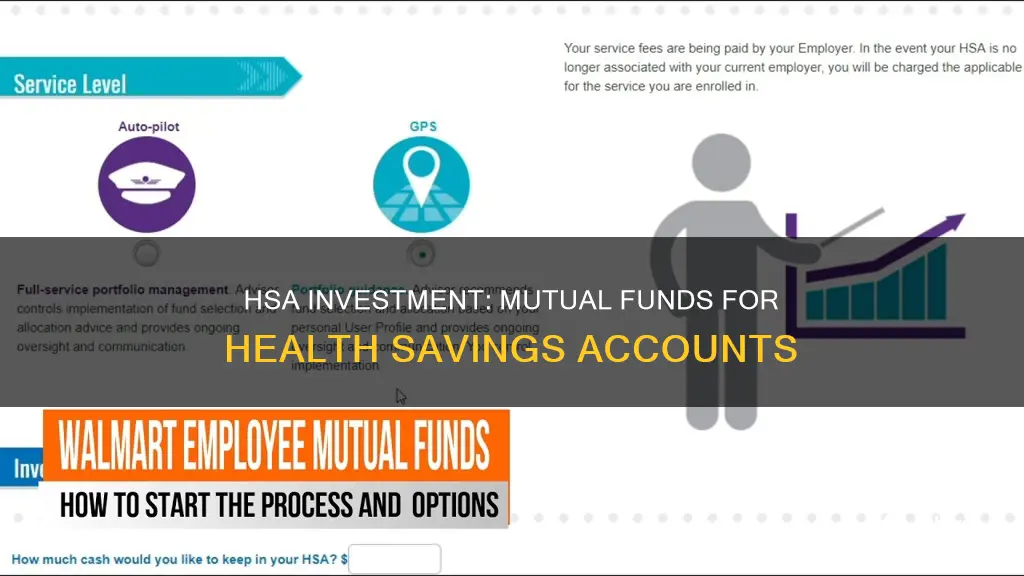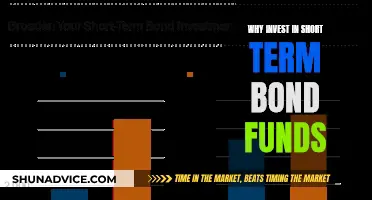
Health Savings Accounts (HSAs) are a great way to save for medical expenses, but they can also be used to invest in mutual funds. HSAs offer a triple tax advantage, meaning contributions are tax-deductible, earnings are tax-free, and withdrawals for qualified medical expenses are also tax-free. This makes them an attractive option for those looking to boost their retirement savings. However, it's important to note that HSAs must be tied to a high-deductible health plan, which may not be suitable for individuals with high medical expenses. When considering investing HSA funds in mutual funds, it's essential to carefully weigh the benefits and drawbacks and consult with a financial professional to determine the best strategy for your personal situation.
| Characteristics | Values |
|---|---|
| Tax on HSA contributions | No federal income tax |
| Tax on HSA investment earnings | No tax |
| Tax on HSA withdrawals for qualified medical expenses | No tax |
| Tax on HSA withdrawals for non-qualified medical expenses | Ordinary income tax |
| Required minimum distributions | No |
| HSA investment options | Exchange-traded funds (ETFs), stocks, bonds, mutual funds |
| HSA contribution limit (2024) | $4,150 for individuals, $8,300 for families |
What You'll Learn

Triple tax advantage
Health Savings Accounts (HSAs) are prized for their triple tax advantages. Firstly, contributions are tax-deductible, meaning no taxes are withheld from HSA contributions made through payroll deductions. This allows every dollar contributed from your paycheck to go directly into your account. Secondly, any interest or earnings on your account are tax-free, which could result in more dollars to use towards qualified health expenses. Finally, you can make tax-free withdrawals from your account to pay for qualified health expenses.
It is important to note that if you withdraw HSA money before turning 65 for reasons other than qualified medical expenses, you will be taxed at your ordinary income tax rate and could incur an additional 20% tax penalty.
SBI Mutual Fund: Smart Investment, Secure Future
You may want to see also

Tax-free growth
Health Savings Accounts (HSAs) are a great way to save for medical expenses, but they can also be used as investment vehicles. Investing in an HSA can be a good idea if you want to take advantage of tax-free growth.
HSAs offer a triple tax advantage. Firstly, you don't pay federal income tax on your contributions. Secondly, you won't be taxed on withdrawals for qualified medical expenses. Finally, and most importantly for investors, your investment earnings won't be taxed. This means that any interest or earnings on the account balance are not subject to income tax. This can make a significant difference to the amount of money you keep over time.
However, it's important to note that if you withdraw money from your HSA before you turn 65 for reasons other than qualified medical expenses, you will be taxed at your ordinary income tax rate and may also incur an additional 20% tax penalty.
To be able to invest your HSA funds, you usually need to meet a minimum balance threshold, which can range from $1,000 to $2,500. Once you've met this threshold, you can choose from various investment options, such as stocks, bonds, mutual funds, or exchange-traded funds (ETFs).
Investing in an HSA can be a great way to boost your retirement savings, especially as HSAs do not have required minimum distributions, and you can use the funds for any purpose after you turn 65.
The S&P 500 Index Fund: A UK Investor's Guide
You may want to see also

Retirement savings
Health savings accounts (HSAs) are a great way to save for future medical expenses and boost your retirement funds. They are available to those with a high-deductible health insurance plan (HDHP) and offer a triple tax benefit: contributions are tax-deductible, the money grows tax-free, and withdrawals for qualified medical expenses are tax-free.
While HSAs are primarily intended to cover health care costs, you can use the money to fund other expenses in retirement, such as housing, living expenses, debt repayment, or even higher education expenses for a grandchild.
- Max out contributions by age 65: The contribution limits for 2024 are $4,150 for individuals and $8,300 for families, with an extra $1,000 catch-up contribution allowed for those aged 55 and older.
- Don't spend your contributions: Treat your HSA as an investment tool for retirement and hold off on spending your contributions to give you a bigger sum at retirement.
- Invest your contributions wisely: Use a similar investment strategy to the one you're using for other retirement assets, such as a 401(k) or IRA, and consider your overall diversification strategy and risk profile.
- Pay health care expenses first: Qualified withdrawals for health care expenses are tax-free, so it's a cost-effective way to fund these costs.
- Reimbursement for medical expenses: You can use your HSA balance to reimburse yourself for medical expenses incurred after you established the account, so keep those receipts!
- Choose a beneficiary: If you're married, your spouse is usually the best choice as they can inherit the balance tax-free.
- Be aware of tax implications: Withdrawing money from an HSA for non-medical expenses before the age of 65 will incur a 20% tax penalty and income tax. After 65, you can take money from an HSA for any reason, but you'll still pay income tax on those distributions.
Some of the best funds to add to your HSA include:
- Vanguard Total Stock Market Index Fund Admiral Shares (VTSAX)
- Vanguard Wellington Fund Investor Shares (VWELX)
- Fidelity 500 Index Fund (FXAIX)
- Schwab Target 2050 Index Fund (SWYMX)
- Schwab Value Advantage Money Fund - Investor Shares (SWVXX)
- Fidelity Short-Term Bond Fund (FSHBX)
Remember, investing in an HSA is not for everyone. HSAs must be tied to a high-deductible health plan, which may not be suitable for those with high medical expenses. It's important to consider your unique circumstances, including your risk tolerance and potential future medical needs, when deciding how to invest your HSA funds.
A Guide to Investing in SBI Mutual Funds
You may want to see also

Medical expenses
A health savings account (HSA) is a great way to save for future medical expenses and boost your retirement funds. HSAs are available to those with a high-deductible health insurance plan, and they help pay for out-of-pocket medical expenses. The minimum deductible for an individual is $1,600 and $3,200 for a family in 2024.
HSAs offer a triple tax benefit: contributions are tax-deductible, any earnings remain tax-free as long as they are used for qualified medical expenses, and money can be withdrawn tax-free at any time to pay for these expenses. This means that HSA funds can be used for medical expenses without incurring any tax costs.
When investing HSA funds, it is important to consider your unique circumstances, including your risk tolerance and potential future medical needs. If you are using an HSA mainly as a retirement account, high-return investments such as stocks may be a good option. On the other hand, if you plan to regularly tap into your HSA for medical expenses, low-risk, low-return options such as money market funds may be more suitable.
It is also worth noting that HSA administrators typically charge a fee to invest funds, and there may be additional fees based on the mutual funds and other investments chosen. These fees can reduce your overall returns, so it is important to consider them when making investment decisions.
In summary, investing HSA funds can be a great way to save for future medical expenses and boost your retirement funds, but it is important to carefully consider your personal circumstances and the associated fees before making any investment decisions.
Liquid Funds India: A Smart Investment Guide
You may want to see also

Investment options
If you're looking to invest your HSA funds, you have a few options. You can choose from various investment vehicles, including stocks, bonds, mutual funds, and exchange-traded funds (ETFs). Some HSA providers may also offer tools to help you select investments and automatically rebalance your portfolio. Additionally, you can opt for more aggressive investments like mutual funds, ETFs, or stocks if you have a longer time horizon until retirement. On the other hand, if you're closer to retirement, you may want to consider less volatile options such as bonds and dividend stocks.
When deciding how to invest your HSA funds, it's important to consider your goals, risk tolerance, and time horizon. Each investment option has its own pros and cons, so be sure to do your research. For example, mutual funds may underperform the overall market, while ETFs may have higher fees. Stocks can be more volatile and require more expertise and research time. Bonds typically have lower returns than stocks but can be less risky.
Another factor to keep in mind is that some HSA providers require a minimum balance before you can start investing. Be sure to check with your HSA administrator to understand the specific investment options available to you and any minimum balance requirements.
Best Debt Funds to Invest in Amid Rising Rates
You may want to see also
Frequently asked questions
Investing your HSA in a mutual fund allows your money to grow faster than by saving alone. Your HSA also has a triple tax benefit: contributions are tax-deductible, growth is tax-free, and withdrawals for qualified medical expenses are not taxed.
You can invest your HSA in a mutual fund in the same way you would an individual retirement account. Some HSAs offer tools that help you choose your investments and provide automatic rebalancing, while others allow you to select from specific investments.
HSAs are only available to those with a high-deductible health plan. If you have high medical expenses, you may need to keep a larger amount of cash in your HSA to cover these costs. Additionally, some HSAs may have high fees or limited investment options.







